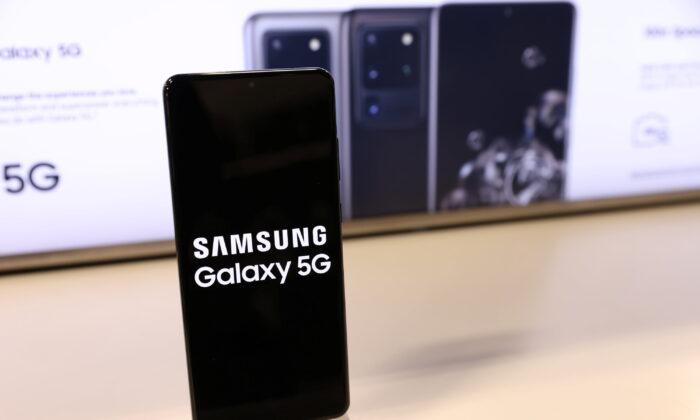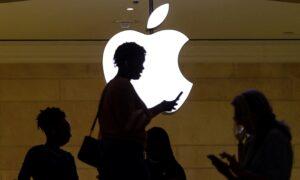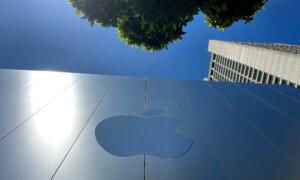Apple has lost the spot of number-one global phone manufacturer to Samsung, with the U.S. tech firm lagging behind in shipments and market share to the Korean brand.
“Global smartphone shipments increased 7.8 percent year over year, to 289.4 million units in the first quarter of 2024,” according to an April 15 press release from the International Data Corporation (IDC). Samsung emerged as the top phone manufacturer in the first quarter, with shipments of 60.1 million units, down from 60.5 million last year. Apple came in second with 50.1 million units in shipments, down from 55.4 million. “While Apple managed to capture the top spot at the end of 2023, Samsung successfully reasserted itself as the leading smartphone provider in the first quarter,” said Ryan Reith, group vice president with IDC’s Worldwide Mobility and Consumer Device Trackers.
“While IDC expects these two companies to maintain their hold on the high end of the market, the resurgence of Huawei in China, as well as notable gains from Xiaomi, Transsion, OPPO/OnePlus, and Vivo will likely have both OEMs looking for areas to expand and diversify,” he said.
Even though Samsung and Apple occupied the top spots, their market share has declined, IDC data showed. Samsung’s market share fell from 22.5 percent in first quarter 2023, to 20.8 percent in first quarter 2024. Apple’s share declined from 20.7 percent to 17.3 percent.
Out of the three other brands tracked by IDC, OPPO saw its market share decline slightly. In contrast, the market share of Xiaomi and Transsion rose, with the latter seeing the biggest increase.
Nabila Popal, research director with IDC’s Worldwide Tracker, said that the smartphone market has evolved from the “turbulence” of the past two years.
“Firstly, we continue to see growth in value and average selling prices [ASPs] as consumers opt for more expensive devices knowing they will hold onto their devices longer. Secondly, there is a shift in power among the top five companies, which will likely continue as market players adjust their strategies in a post-recovery world,” she said.
“While the top two players, Samsung and Apple, both saw negative growth in the first quarter, it seems Samsung is in a stronger position overall than they were in recent quarters.”
The falling market share and shipments may be a red flag for Apple. Though the company’s first-quarter earnings beat analyst estimates, a 13 percent decline in sales in China cast a long shadow on the tech firm.
The tech giant has been hit with a series of downgrades as well. Barclays moved the stock down from equal weight to underweight, setting a price target of $160 in January. Piper Sandler downgraded Apple to neutral.
The China Impact
According to a report by tech research firm Counterpoint, while China’s overall smartphone unit sales fell 7 percent year over year in the first six weeks of this year, Apple turned out to be the worst performer.The U.S. tech behemoth’s unit sales growth crashed by 24 percent during this period. This is a big issue for Apple because China is a major market for the tech company.
In 2023, the combined markets of China, Hong Kong, and Taiwan accounted for almost 20 percent of the company’s total sales. As such, a major sales decline in this region means a big impact on Apple’s revenues and profitability.
Multiple factors are cited for the sharp fall in sales. “Primarily, it faced stiff competition at the high end from a resurgent Huawei while getting squeezed in the middle on aggressive pricing from the likes of OPPO, Vivo, and Xiaomi,” said Counterpoint senior analyst Mengmeng Zhang.
“Although the iPhone 15 is a great device, it has no significant upgrades from the previous version, so consumers feel fine holding on to the older-generation iPhones for now.”
Some experts attribute the crash in Apple sales to political machinations of the Chinese Communist Party (CCP).
“More than a civilian cell phone company, Huawei is backed by all the communications facilities related to national defense. Moreover, the CCP desires to use civilian products to support the exploration and deployment of its military communications technology and appliance: this is its political motive,” he said.
The Chinese regime has banned public officials from using foreign-branded phones at the workplace, including Apple’s iPhones, pointing to security concerns.
However, Mr. Xie dismisses the Chinese regime’s excuse of security concerns regarding Apple, noting that the U.S. tech firm complied with the CCP request and agreed to set up a data center in Guizhou in southwestern China to retain data within the nation.
“Therefore, there are no security risks that the Apple technology will leak Chinese consumers’ data—unlike the CCP’s collection of Western consumers’ data through TikTok,” he said. “The purpose of suppressing Apple is to help Huawei.”







